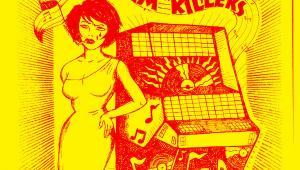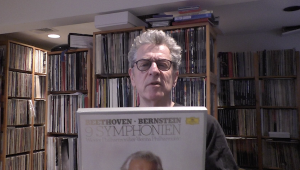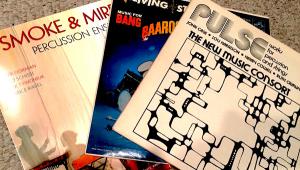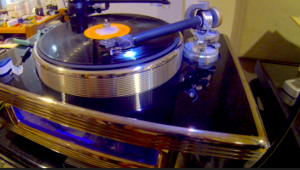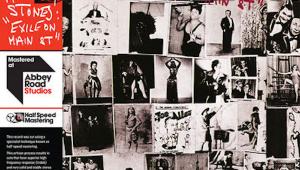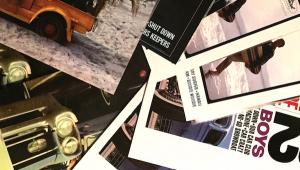The Two New* Rolling Stones Box Sets: Deal or No Deal? Part I
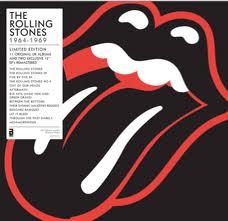
In unprecedented music business collaboration, ABKCO and Universal Music Group combined production and marketing might to produce numbered, limited edition vinyl box sets covering forty years of Rolling Stones recorded output.
The sets cover much of the catalogue (but not everything) from Chuck Berry’s “Bye Bye Johnny” that opens their debut four song EP released January 10th, 1964 to the final fade of “laughinearlydied” from 2005’s A Bigger Bang. Because the ABKCO set faithfully covers the UK original Deccas, it omits material only found on American London issues.
ABKCO, which controls the 1964-1969 Decca/London years, produced The Rolling Stones 1964-1969 ($369) while Universal Music group contributed The Rolling Stones 1971-2005 ($399) the period covering the group’s output on its own label that was originally distributed by Atco, then parent company Atlantic Records and later Columbia. The Stones signed to Virgin in 1992 and issued a few records there and now UMG distributes them all. .
The ABKCO box features nine studio albums, two EPs plus the two greatest hits packages necessitated by the fact that UK albums back then omitted the hit singles. The two EPs (The Rolling Stones and Five By Five) and the first three LPs are issued in mono, while the eight other albums, including the two greatest hits packages and Metamorphosis issued in 1975 but containing mostly un-issued tracks from the Decca era are in stereo (two tracks included on this Metamorphosis were not on the original 1975 vinyl release). Get Yer Ya-Ya’s Out was issued separately last year in a boxed set edition and so was not included, nor was the double LP Hot Rocks, that ABKCO did issue on vinyl in 2004.
The UMG box is a more straightforward affair, covering the fourteen albums from Sticky Fingers to the aforementioned A Bigger Bang. The attention paid today to a rock band formed more than forty years ago lends credence to the then seemingly ridiculous words of Rolling Stones publicist/annotator Andrew Loog Oldham who opened his notes for the group’s first album with “The ROLLING STONES are more than just a group—they are a way of life.”
The Physical Product
Both boxes are nicely turned out, sturdy affairs. The cover art is reasonably well reproduced. The Decca era scans are very good. Clearly, care was taken and unless you compare them to originals, they look okay, printed on pleasingly opaque paper stock that gives them a somewhat washed out, less than vibrant look. However, you’re dreaming if you were expecting the Decca box to include “Clarifoil” laminated fold-over jackets!
The original Decca mono label art looks nice on the early elpees, though the “ffrr ear” is absent (perhaps a trademark issue?) and the color is a bit more maroon than red, but for some reason rather than carry through with the blue FFSS Decca label for the stereo releases, the producers chose to use a blue version of the mono label design—again perhaps due to a trademark consent issue.
Through the Past, Darkly (Big Hits Vol.2) features the octagonal die-cut cover and retains the Decca mono/stereo “peephole” plus the mini-instruction manual inner sleeve—a nice touch that’s not reprised on Let It Bleed
. Reproducing Their Satantic Majesties Request’s lenticular 3-D cover was too much to ask, but the rich look of the foil cover is a nice compensatory touch and of course in 2-D you can more easily find The Beatles on the cover.
The Decca box rightfully reprises Beggar’s Banquet’s “banned” graffiti/toilet cover. Overall, the producers did a nice job with the Decca-era cover art given the cost realities of putting out a multiple LP box set, plus you get the two EPs the originals of which most Americans have never seen in the flesh. The Rolling Stones Records era is reasonably well reproduced as well, with all inserts and labels, though the yellow is too “mustardy” and again, the opaque paper lends a washed out quality to the artwork.
There’s no zipper on Sticky Fingers or stickers on the Undercover cover and the estates of the offended gals are still blocked out on Some Girls, which omits the die-cut cover and insert. The UMG box reprises the inaccurate sepia-toned cover art used for the recent Exile on Main Street box. Perhaps that’s what The Stones originally wanted but was denied by Atlantic?
Neither box includes annotation, photos, record collector notes, technical notes (though the ABKCO box does list the archiving and mastering credits on the jackets), or any sort of historical enhancement, which is an opportunity lost, but that would have required even bigger, heavier boxes, which would have cost even more to produce and ship—don’t forget about shipping costs! These boxes are heavy.
Incidentally, my source at EMI says The Beatles box has been repeatedly delayed because of difficulties producing the sumptuous book planned for the vinyl set.
The Music
Please, what can I add to the blather that hasn’t been said over the past forty years about this music, these records and The Rolling Stones? I first saw them in the Cornell University gym in 1965 at an afternoon concert after a football game!
The Rolling Stones started out as blues and R&B purists dutifully copying their heroes. The first EP has songs by Chuck Berry (“Bye Bye Johnny”), Berry Gordy (“Money” originally sung by Barrett Strong), Leiber/Stoller (“Poison Ivy” sung by The Coasters) and Arthur Alexander (“You Better Move On”). Now, how many kids back then knew Arthur Alexander? Mick and Keith did and so did Lennon and McCartney. The Beatles covered his “Anna.” But how many people today know the late, still great Arthur Alexander?
So these Stones were blues and R&B aficionados who did pretty good covers. Who could have predicted what was to come? The same could be said about The Beatles. George Martin didn’t think much after hearing The Beatles demos and their first attempts at original song writing.
There was something in the air back then including an incredible feedback loop between the young musicians and their fans, not to mention inter-group competition that produced an atomic chain reaction of creativity that’s not likely to happen again.
With the exception of Their Satantic Majesties Request there’s not a bad record in the Decca/ABKCO set, and even that misguided psychedelic effort has its moments. Mick had an affair with a “random computer” in 1967? Way ahead of his time!
Listening back today it’s much easier to hear the influences. “Jigsaw Puzzle?” There’s Bob Dylan! “Yesterday’s Papers?” Motown. The Stones were great at latching onto styles and trends and making them their own. Even on the early covers it was obvious that these boys had strong unique personalities that would soon surface and overwhelm the influences.
The UMG box tracks a group’s eventual descent from greatness as the timeline unfolds, but there’s still plenty of it left as the recharged group began recording for its own label.
Sticky Fingers, Exile.. (the greatest “next gen” Stones album) and the others at least through Undercover were all great—even Goat’s Head Soup, long considered a dud musically and sonically provides a better listen in retrospect. As the guys aged and Mick felt obliged to sing silly stuff like “She Was Hot,” they became less convincing. They were no longer living it as on Exile…. Instead, it was caricature, but the further we get from it in time, the better it gets!
Loog Oldham was correct: The Rolling Stones remain for many “a way of life” even if I did recently see a 24 year old girl on “The Ellen Degeneres Show” unable to immediately answer the question “What band is Mick Jagger in?” (Reality check: I don’t watch Ellen’s show. I walked in on my wife watching it).
While the Stones remain popular, they still are the dark force in contrast to The Beatles’ light. That’s why well-scrubbed youngsters today still respond to The Beatles. The Stones? Not so much. And that’s how it should be.
How They Sound: The ABKCO Box
Here the companies went their separate ways. While ABKCO did not go back to the original tapes for another DSD go round, nor was that really necessary, since the first pass was so meticulously accomplished, this box does sound different from the first vinyl release back in 2004.
Here’s where the SACD enthusiasts chime in: “If the original source is DSD why would you want to listen to vinyl when you can get the SACDs?”
A reasonable question were ABKCO still in the SACD business. When Sony reduced to one day a week and then closed its Terre-Haute Indiana SACD line, ABKCO got out.
The SACD layer was almost a “hobbyist/public service” for ABKCO since the discs were deliberately marketed, priced and stocked as CDs. Most buyers didn’t even know what an SACD was and could care less. ABKCO didn’t care either—until they couldn’t get product. So, ironically, in this digital age, the best way to hear the DSD Stones transfers is on vinyl.
To go back to the early 2000s: restoration producer Jody Klein assembled a team on both side of the Atlantic to research analog tapes and oversee the transfers. Steve Rosenthal at The Magic Shop oversaw the restoration and archiving while Teri Landi oversaw the archival research and the actual A/D conversions. Bob Ludwig did the mastering, while Gus Skinas—a name familiar to SACD enthusiasts—was the DSD engineer. During the original archiving all “electronically reprocessed for stereo” tracks were removed from the catalog and a few stereo mixes that had never before been officially released replaced them. The rest appeared in the original mono.
Beggar’s Banquet, it was discovered, was originally issued at the wrong speed on both sides of the Atlantic. The mix down machine ran too fast so when the master played back for the lacquer cutting on a machine running at the correct speed, the tape played back too slow. No wonder the original album sounded thick and slightly muddy! That’s been fixed and the difference is major.
For this box, according to ABKCO’s Teri Landi, the DSD masters were converted to 192k/32 bit and 192/24 bit WAV files (she didn’t say why two bit rates were utilized) using Weiss Sarcon conversion software. The files were sent to GZ Digital Media in the Czech Republic, which cut DMM and pressed the 180g vinyl.
The original hybrid SACD release included both American and UK releases, which often had different tracks. This vinyl box gives you the original mono mixes of the UK originals only, so inevitably, some tracks found only on the American originals (like “2120 South Michigan Avenue” in stereo for the first time) are missing here—as are stereo mixes of favorites like “Satisfaction,” “Heart of Stone,” and many others that you can only hear in stereo on the SACD and later CD-only releases. No matter, we love mono!
Perhaps if this set is successful ABKCO will compile a stereo Stones LP featuring an assortment of the remixes. In any case, the goal here was to give you the originals, with minor fixes where needed.
For instance, when you play Big Hits (High Tide and Green Grass) you’ll hear the alternative “Time is On My Side” in genuine stereo. This one cops even more from Irma Thomas’s spectacular original. Unlike the original Big Hits, which uses electronically reprocessing on the mono mixes, here the monos are mono and the stereos are stereo—and that’s a major improvement.
So all of the archival and correction work done in 2003 applies to these vinyl reissues. The original 2003 DSD, converted to PCM sourced vinyl and DMM mastered at New York’s Europadisc by Don Grossinger and pressed at RTI, doesn’t sound nearly as dynamic, vibrant and “tape-like” as these new transfers using the latest digital conversion software. And these GZ 180g pressings are dead quiet and physically superb (as were the RTIs).
Here's Part II.
